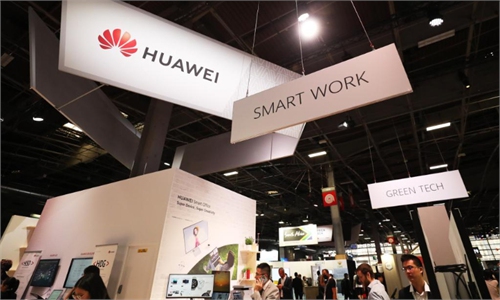Biden administration's plan to curb investment by US firms in Chinese tech just 'a show,' experts say

Photo:VCG
Chinese experts slammed the US plan that reportedly will curb investment by US firms in Chinese tech, saying the plan is "a show" and warning that US allies should take a cautious attitude toward it.
The comments came after the New York Times (NYT) reported on Thursday that the administration of President Joe Biden is poised to introduce new restrictions on US companies funding the development of advanced computing technologies in China.
The administration has been working on ways to curb investment by US firms for months and the measures are now largely complete and could be issued within two months, the newspaper said, citing people familiar with the discussions.
The details of the pending executive order remain unclear, the report said, but they are expected to require companies to report more information to the government about their planned investments in certain "adversarial" countries.
The order would likely prohibit outright investment in some sensitive areas, like quantum computing, advanced semiconductors and certain artificial intelligence capabilities with military or surveillance applications, the NYT said, citing several people familiar with the plans.
"The plan is a show instead of having any real effect," Xiang Ligang, director-general of the Beijing-based Information Consumption Alliance, told the Global Times on Friday, adding that it is only a political tool for the government to try to curb China's tech power.
The more prohibition measures taken against China's tech industry, the more investment will be gained, Xiang said.
"The curb on investment will hurt US stocks further," Han Xiaomin, general manager of Jiwei Insights in Beijing, told the Global Times on Friday.
If US capital is not allowed to invest in Chinese tech, such tech companies will move to Hong Kong, which will be bad news for the US capital market, Han said.
The US has taken a slew of measures to impose export controls, including cutting China off from certain semiconductor chips made anywhere in the world with US equipment, amid "tech decoupling" with China.
Last month, the US reached an agreement with the Netherlands and Japan to restrict exports of some advanced chipmaking machinery to China, including advanced lithography tools, Bloomberg reported recently, citing sources.
The US' move to expand the semiconductor export ban on China to companies in Japan and the Netherlands - a typical practice of long-arm jurisdiction - has seriously harmed the principle of sovereign equality of states, infringed on the multilateral international order with the UN at the core, distorted global trade, and hurt the interests of companies in the countries concerned, China's Foreign Ministry said on Friday.
The New York Times also reported that US Department of the Treasury had reached out to other governments, as well as the European Union, to try to ensure they do not provide similar financing to China after the US cuts it off.
Xiang warned that US allies such as South Korea and Japan should take a cautious attitude toward the plan, give that the US has always been willing to sacrifice the interests of its allies for its own purposes. This "has happened several times," Xiang said.
Chinese experts also said that China should continue to improve its own tech capabilities to deal with the possible impact of the US' moves and the effort to draw allies to join its tech war against China.
Chinese semiconductor firms are making all-out efforts to achieve breakthroughs in core technologies, in order to boost self-reliance.
China's top chipmaker Semiconductor Manufacturing International Corp on Thursday reported record revenue and gross margins for 2022. For the full year of 2022, the company's revenue jumped 33.6 percent from the year before to a record high of $7.27 billion. Meanwhile, the gross margin increased to 38 percent in 2022, also hitting a record high.


